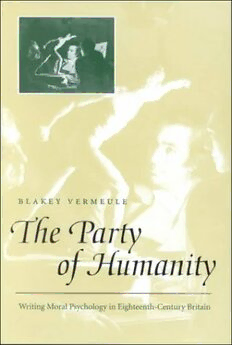
The Party of Humanity: Writing Moral Psychology in Eighteenth-Century Britain PDF
Preview The Party of Humanity: Writing Moral Psychology in Eighteenth-Century Britain
The Party of Humanity The Party of Humanity Writing Moral Psychology in Eighteenth-Century Britain Blakey Vermeule ©The Johns Hopkins University Press All rights reserved.Published Printed in the United States ofAmerica on acid-free paper The Johns Hopkins University Press North Charles Street Baltimore,Maryland - www.press.jhu.edu Library ofCongress Cataloging-in-Publication Data Vermeule,Blakey. The party ofhumanity :writing moral psychology in eighteenth-century Britain /Blakey Vermeule. p. cm. Includes bibliographical references and index. ---(acid-free paper) . English literature—th century—History and criticism. . Psychology—Great Britain—History—th century. . Ethics—Great Britain—History—th century. . Psychology—Moral and ethical aspects. . Self (Philosophy) in literature. . Moral development in literature. . Ethics,Modern—th century. . Psychology in literature. . Psychology—Philosophy. . Ethics in literature. I. Title. .v .(cid:1)—dc - A catalog record for this book is available from the British Library. To Emily,Cornelius,and Adrian Vermeule and Lisa Freeman What wonder then,that moral sentiments are found of such influence in life;though springing from principles, which may appear,at first sight,somewhat small and deli- cate? But these principles,we must remark,are social and universal;they form,in a manner,the party ofhuman- kind against vice or disorder,its common enemy. — , Inquiry Concerning the Principle ofMorals () It seems to me natural to think that art is more deeply rooted in human nature than morality,and I am sur- prised that philosophers make little ofthe fact that, though good art is more likeable than bad art,virtuous people do not enjoy this same advantage over those to whom we are drawn primarily for their charm,or their gaiety,or their sweetness oftemper,or their outrageous- ness. — , The Mind and Its Depths () Contents Acknowledgments xi One Introduction:Some Paradoxes ofMoral Psychology Part I Alexander Pope:The Art of Obligation Two Formalism,Criticism,Obligation Three “To Virtue Only and Her Friends,A Friend”: A Sequence ofEarly Portraits Four Abstraction,Reference,and the Dualism ofPope’s Dunciad Part II The Spectator Morality of the Enlightenment Five The Kindness ofStrangers:Johnson’s Life ofSavage and the Culture ofAltruism Six Pride’s Reasons:Hume’s Spectator Morality Seven Jovial Fanatics:Hume,Warton,Cowper Notes Works Cited Index
